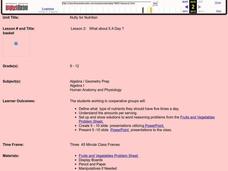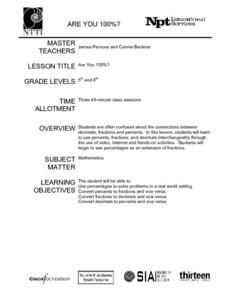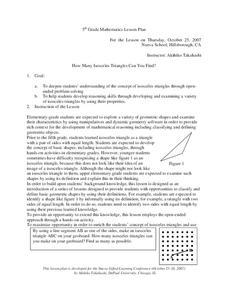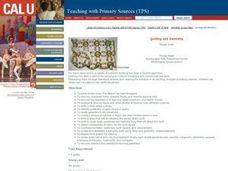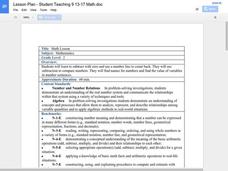Curated OER
Applications of Triangles
Students apply the properties of a right triangle. In this triangle lesson, students describe and compare radians to degrees. They solve problems using the properties and ratios of a right triangle.
Curated OER
Penny's Pizza
Students develop a list of possible outcomes as a method of finding probability related to a pizza statistics problems. They read the problems together as a class, brainstorm ways to solve the problem, and in partners solve the pizza...
Curated OER
Nutty for Nutrition
Students create a PowerPoint presentation detailing daily intake of nutrients. In this nutty for nutrition instructional activity, groups of students conduct Internet research to determine what type of nutrients should be consumed on a...
Curated OER
The Secret of the Crystal Ball
Eighth graders use mathematical expressions to solve problems. In this basic properties of operations, 8th graders use prior knowledge and logical reasoning to solve equations. Students analyze an equation by solving a trick problem to...
Curated OER
Are You 100%?
Students use decimals, fractions, and percents to solve problems in a real world setting.
Curated OER
Dominoes
Fourth graders solve a dominoes word problem, calculating all the possible outcomes for a sequence of events. They discuss the problem, apply counting strategies, create a tree diagram, and write an explanation of how they solved the...
Curated OER
Another Dartboard
Fifth graders solve a word problem that involves predicting probabilities of an event and making deductions from probabilities. They discuss dice and coins and the probability of rolling each number or face of the coin, and in small...
Curated OER
Which Method Will You Choose? Finding Solutions to Systems of Equations.
Ninth graders investigate systems of linear equations. In this Algebra I lesson, 9th graders determine which method is the best for solving a systems: graphing, substitution, or elimination. Students choose a method and create a...
Curated OER
It's About Time!
Students read a short tutorial and complete one or more online activities. They visit an online math dictionary to learn the value of a day, month, week, and year. In addition, they construct word problems based on a favorite month;...
Curated OER
Peter's Second String
Fifth graders determine the maximum area and range of areas of a rectangle with a given perimeter. They discuss a word problem involving perimeter and area as a class, investigate the word problem using a piece of string, and in small...
Curated OER
How many isosceles Triangles Can You Find?
Fifth graders solve problems while examining a variety of isosceles triangles. In this isosceles triangle lesson, 5th graders examine shapes to find their characteristics. Students pay particular attention to the characteristics of...
Curated OER
The Five Number Game
Learners explain what it means to square numbers. They explain what it means to cube numbers. Students define prime numbers using their own language. They are introduced to the problem by playing one game as a class.
Curated OER
Coloring Interval Graphs
Students investigate planning an activity and getting it done on time. In this algebra lesson, students define vocabulary words related quadratic equations, including the vertex and intervals. They figure a good way to color graphs...
Curated OER
The "Art" of Baseball
Students investigate the art of baseball. In this sports lesson plan, students discuss their thoughts about the sport of baseball and create a baseball word list. Students use pattern blocks and drawing paper to create a simulated...
Curated OER
Geometry and Quilting
Students create a quilt square for a class quilt using at least three, two-dimensional geometric figures. They research and write a brief description of at least two different quilt patterns that they find. Pupils discuss that quilts are...
Curated OER
Division
Students solve math problems using division and multiplication facts. In this math lesson plan, students explain the relationship between division and multiplication. Additionally, students identify how many objects make up both groups.
Curated OER
Patterns Here, There, and Everywhere!
Upper graders access the Microsoft Word program and create patterns by utilizing certain keys on the keyboard. They create picket fences, smiley faces, and hearts. It seems that this lesson has as much to do with keyboarding skills as it...
Curated OER
Picture the Problem
Students create an illustration of how to solve math problems. They use appropriate resources for solving the problems. Students have to demonstrate how drawing diagrams and using pictures can help them by using KidPix. On Slide One,...
Curated OER
Compare Two Numbers: How Many Times More Than...?
Explore the concept of "how many times" where the word "times" is defined. Learners will determine the product and quotient in a word problem. Then use manipulatives to solve the problem. Finally, they will write in their math journals...
Curated OER
The Key to Word Problems
Students learn the key words to look for in multiplication and division word problems, to help them decide which operation to use. They analyze, wrte, and solve multiplication problems.
Curated OER
Number Line Math
Second graders use a number line to practice subtraction. For this subtraction lesson, 2nd graders use a number line to count backwards. Students participate in mad math activities and solve problems.
Curated OER
You Can Stop!!
Students analyze smoking behavior based on peer pressure. In this health lesson plan, students read and complete worksheets on the internet concerning the behaviors associated with smoking. They summarize what they have learned by...
Curated OER
Transportation Math
Students explore the concept of exponents. In this exponents lesson, students evaluate various bases to powers. The bases to a given power are in the context of miles driven, stops on a route, and minutes spent in route. Students read...
Curated OER
Similar Triangles - Applied Problems
Students differentiate between similar and congruent triangles. In this geometry instructional activity, students identify the angles of triangles using the similarity theorem. They apply concepts of triangles to the real world.




